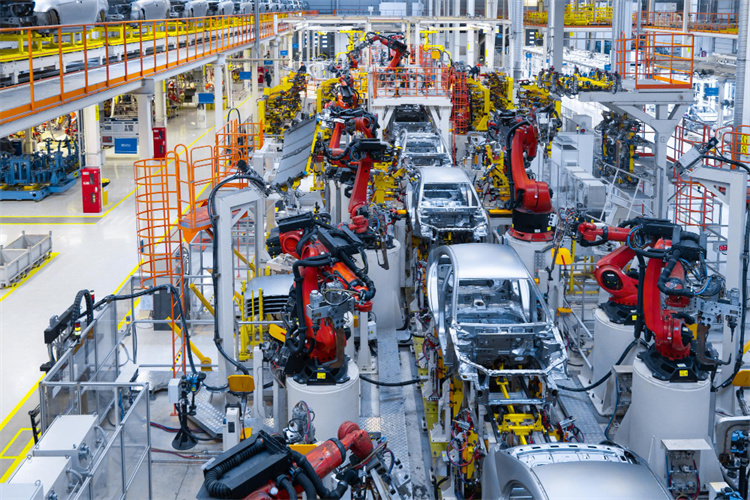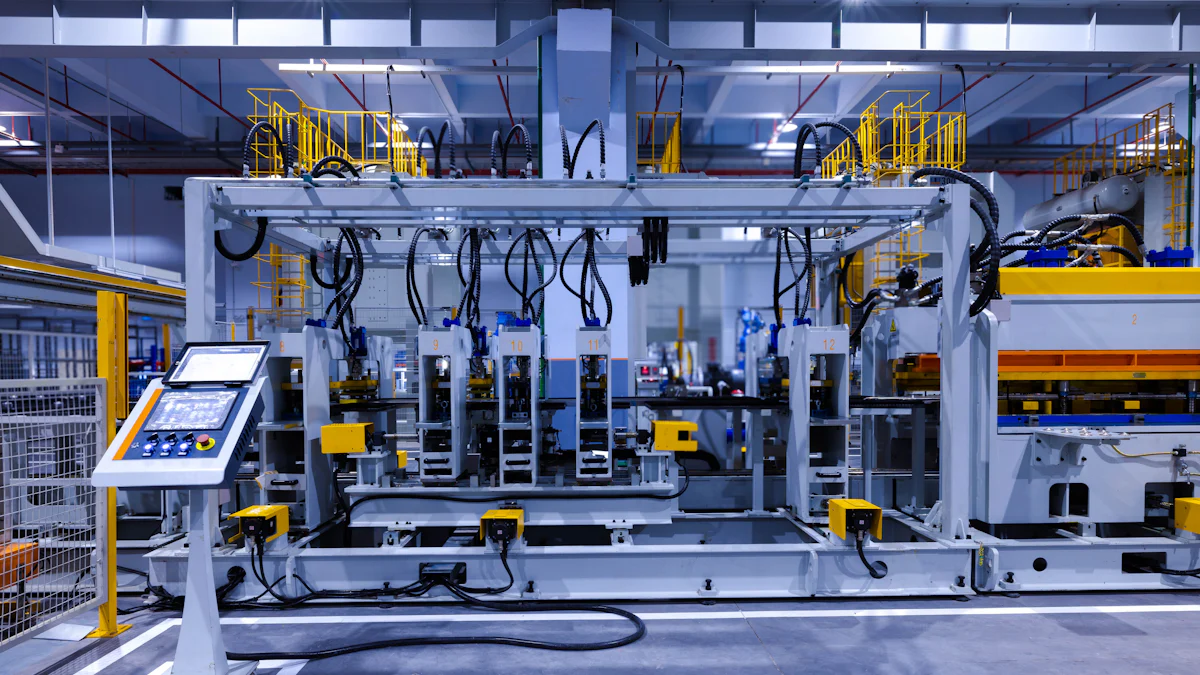Shifts in Vietnam's Automotive Supply Chain Landscape

Vietnam's automotive industry has experienced remarkable growth over the past two decades. The sector has expanded annually by 20-30%, reflecting a robust market development. The number of domestically produced vehicles increased from 287,586 in 2018 to 439,600 in 2022. The automotive supply chain plays a crucial role in this growth, ensuring efficient production and distribution. Recent shifts in the supply chain landscape have positioned Vietnam as a significant player in the global market. The forecast predicts a 10% increase in new cars on Vietnam's roads within the next five years, highlighting the industry's potential.
Current State of Vietnam's Automotive Industry

Market Overview
Industry Size and Growth
Vietnam's automotive industry has emerged as one of the fastest-growing markets in Southeast Asia. The sector has witnessed significant expansion, driven by increasing demand for personal transportation. The number of cars sold has surged due to rising purchasing power and a growing middle-class population. Despite this growth, Vietnam's production numbers lag behind regional counterparts. In the first two months of 2023, Vietnam produced 21,583 cars, marking a 34.7% decrease from the previous year. In contrast, Malaysia saw a 29.8% increase with 122,325 units, while the Philippines experienced a 63.8% rise with 18,592 units. Vietnam's automotive supply chain remains heavily reliant on imported advanced parts, affecting the competitiveness of domestically-produced vehicles.
Key Segments and Products
The Vietnamese automotive market comprises various segments, including passenger vehicles, commercial vehicles, and motorcycles. The passenger vehicle segment has been the fastest-growing, reflecting the increasing preference for private transportation. Vietnam hosts around 56 automotive plants, with 18 foreign-invested companies and 38 domestic enterprises. The automotive supply chain in Vietnam focuses on assembling basic components rather than advanced technologies. This reliance on imported parts leads to higher pricing for locally manufactured cars. The industry's growth potential remains high, but challenges persist in achieving competitive pricing and quality.
Major Challenges
Infrastructure and Logistics
Vietnam's automotive supply chain faces significant challenges in infrastructure and logistics. The country's infrastructure development has not kept pace with the rapid growth of the automotive sector. Inefficient logistics systems and inadequate transportation networks hinder the smooth flow of goods within the supply chain. Automotive clusters primarily located in Dong Nai province and surrounding areas face strict regulations for investors. These challenges impact the overall efficiency and cost-effectiveness of the automotive supply chain in Vietnam.
Skilled Workforce Availability
The availability of a skilled workforce poses another challenge for Vietnam's automotive industry. The sector requires a highly trained workforce to meet the demands of modern automotive manufacturing processes. However, the country struggles with a shortage of skilled labor, affecting the industry's ability to produce advanced automotive technologies. To address this issue, the Vietnamese government encourages domestic enterprises to leverage global supply chain shifts. By enhancing competitiveness and market presence, Vietnam aims to integrate more deeply into the global automotive supply chain.
Investment Trends in the Automotive Supply Chain

Foreign Direct Investment (FDI)
Key Investors and Partnerships
Foreign Direct Investment (FDI) has played a pivotal role in shaping Vietnam's Automotive Supply Chain. Major international corporations have recognized Vietnam's potential as a strategic hub for automotive manufacturing. Companies like Toyota, Ford, and Hyundai have established significant operations within the country. These global giants have formed partnerships with local enterprises to bolster production capabilities. Collaborative efforts between foreign investors and Vietnamese companies have led to the establishment of advanced manufacturing facilities. These partnerships have facilitated technology transfer and skill development, enhancing the overall efficiency of the Automotive Supply Chain.
Impact on Local Industry
The influx of FDI has significantly impacted Vietnam's local automotive industry. Foreign investments have introduced cutting-edge technologies and best practices into the domestic market. This has elevated the standards of production and quality control within the Automotive Supply Chain. Local suppliers have benefited from increased demand for components and parts. The presence of international brands has created opportunities for Vietnamese enterprises to integrate more deeply into the global supply chain. Experts emphasize the need for Vietnamese companies to align with the management culture and business philosophy of global manufacturers. By doing so, local enterprises can enhance their competitiveness and become integral players in the global Automotive Supply Chain.
Domestic Investment Initiatives
Government Incentives
The Vietnamese government has implemented various incentives to attract investments in the Automotive Supply Chain. Tax breaks, subsidies, and favorable policies have been introduced to encourage both foreign and domestic investments. These incentives aim to stimulate growth and innovation within the sector. The government has prioritized the development of infrastructure and logistics to support the burgeoning automotive industry. By creating a conducive environment for investment, Vietnam seeks to strengthen its position in the global Automotive Supply Chain.
Private Sector Contributions
Private sector contributions have also played a crucial role in advancing Vietnam's Automotive Supply Chain. Local enterprises have invested in research and development to enhance their capabilities. Companies have focused on improving production processes and adopting sustainable practices. The private sector has collaborated with educational institutions to develop a skilled workforce. By investing in training programs, businesses aim to address the shortage of skilled labor in the automotive industry. These efforts contribute to the overall growth and competitiveness of Vietnam's Automotive Supply Chain.
Key Players in the Automotive Supply Chain
Major Automotive Manufacturers
VinFast
VinFast, a prominent player in Vietnam's automotive industry, has gained international recognition. The company, part of Vingroup Corporation, began operations in 2017. VinFast focuses on both gasoline and electric vehicles. In 2022, VinFast shifted its focus entirely to electric cars. The company exported electric vehicles to global markets, including the United States. Models like VF8 and VF9 have positioned VinFast as a leader in the high-end SUV segment. VinFast sold nearly 23,000 units in 2022, securing the eighth spot among Vietnam's best-selling car brands. The company's shares are listed on the Nasdaq stock exchange, reflecting its growing influence.
International Brands
Several international brands have established a strong presence in Vietnam's automotive market. Toyota Vietnam leads the market with nearly 100,000 vehicles sold in 2022. The Toyota Vios remains the best-selling model. Honda Vietnam achieved a 41.2% increase in car sales in 2022, focusing on models like the Honda Civic and Honda CR-V. Ford Vietnam LLC sold approximately 30,000 units, with the Ford Ranger pickup truck being a top seller. Mitsubishi Motors Vietnam Co., Ltd. ranks fourth in sales, with the Mitsubishi Xpander being the most popular model. Hyundai Thanh Cong Vietnam Joint Stock Company (HTV) launched nearly 70,000 vehicles in 2022, showcasing the strength of international brands in Vietnam's Automotive Supply Chain.
Component Suppliers
Local Suppliers
Local suppliers play a crucial role in Vietnam's Automotive Supply Chain. Over 400 Vietnamese component suppliers have qualified as Tier-1 vendors for major carmakers. These suppliers contribute significantly to the production process. Local enterprises focus on assembling basic components. The Vietnamese government encourages these suppliers to leverage global supply chain shifts. By doing so, local suppliers can enhance their competitiveness and integrate more deeply into the global market.
International Suppliers
International suppliers have also become integral to Vietnam's Automotive Supply Chain. These suppliers provide advanced parts and technologies that local manufacturers rely on. Partnerships between international suppliers and Vietnamese companies facilitate technology transfer. This collaboration enhances the overall efficiency and quality of the supply chain. International suppliers contribute to the growth and development of Vietnam's automotive industry. Their involvement ensures that Vietnamese manufacturers can meet global standards.
Government Policies and Regulations
Trade Agreements and Tariffs
ASEAN Free Trade Area
The ASEAN Free Trade Area (AFTA) has significantly influenced Vietnam's automotive supply chain. AFTA imposes a 0% tariff on auto components and spare parts for ASEAN countries. This policy encourages the importation of essential parts at reduced costs. Vietnamese manufacturers benefit from this agreement by accessing affordable components. The cost reduction enhances the competitiveness of locally assembled vehicles. The automotive industry in Vietnam experiences growth due to these favorable trade conditions.
Bilateral Agreements
Bilateral agreements play a crucial role in shaping Vietnam's automotive landscape. The EU-Vietnam Free Trade Agreement (EVFTA) exemplifies such an agreement. EVFTA commits Vietnam to eliminate import taxes on EU automotive exports. This agreement facilitates trade by reducing tariffs over a period of three to ten years. Vietnamese consumers enjoy access to high-quality European vehicles at competitive prices. The agreement addresses non-tariff barriers, promoting smoother trade relations. Vietnam's automotive industry benefits from increased collaboration with EU manufacturers.
Environmental and Safety Regulations
Emission Standards
Vietnam enforces strict emission standards to protect the environment. These regulations aim to reduce air pollution caused by vehicle emissions. The government mandates compliance with Euro 4 and Euro 5 standards for new vehicles. Manufacturers must ensure that their vehicles meet these stringent requirements. Compliance with emission standards enhances the environmental sustainability of the automotive sector. Vietnamese authorities monitor and enforce these regulations to maintain air quality.
Safety Compliance
Safety compliance remains a top priority for Vietnam's automotive industry. The government implements rigorous safety standards for vehicles. These regulations ensure the protection of consumers on the road. Manufacturers must adhere to safety guidelines during production. The Ministry of Industry and Trade oversees the enforcement of these standards. Compliance with safety regulations fosters consumer confidence in locally produced vehicles. Vietnamese consumers benefit from enhanced safety features in their automobiles.
Investment Opportunities and Support Services
Emerging Market Segments
Electric Vehicles
Vietnam's automotive industry sees a surge in electric vehicle (EV) production. The government supports this growth with favorable policies. VinFast leads the charge in EV manufacturing. The company aims to introduce Vietnamese-made electric cars globally. Vietnam expects to have one million EVs on the road by 2028. This presents a lucrative opportunity for investors. The demand for eco-friendly transportation grows steadily. Investors can capitalize on this trend. The government's incentives make Vietnam an attractive destination for EV production.
Autonomous Vehicles
Autonomous vehicles represent another promising segment. Vietnam's automotive sector explores self-driving technology. The country seeks to become a leader in this field. Research and development efforts focus on innovation. Companies invest in creating advanced autonomous systems. The potential for growth in this market is significant. Investors can benefit from early entry into this emerging sector. The government's support for technological advancements boosts confidence. Vietnam positions itself as a hub for autonomous vehicle development.
Support Services and Infrastructure
Logistics and Distribution
Efficient logistics and distribution systems are vital for the automotive supply chain. Vietnam invests in improving infrastructure to support growth. The development of modern transportation networks enhances connectivity. Efficient logistics reduce costs and improve delivery times. Companies benefit from streamlined supply chain operations. The government's focus on infrastructure development attracts investors. Opportunities exist for businesses to provide logistics solutions. The demand for efficient distribution services continues to rise.
Research and Development Facilities
Research and development (R&D) play a crucial role in the automotive industry. Vietnam encourages investment in R&D facilities. Companies focus on innovation and technological advancements. The government supports these efforts with incentives. R&D centers drive progress in electric and autonomous vehicles. Investors can contribute to the development of cutting-edge technologies. The growth of R&D facilities strengthens Vietnam's position in the global market. Opportunities abound for businesses to collaborate on innovative projects.
The analysis of Vietnam's automotive supply chain reveals several key insights. The industry experiences rapid growth, driven by economic improvements and a rising middle-class population. Global carmakers like Toyota, Honda, and Ford have invested significantly in Vietnam. The introduction of VinFast and government support for electric vehicles further boosts the industry's potential. Challenges remain, such as competition from imported vehicles and meeting global standards. However, Vietnam's automotive industry is poised for a promising future. Investors should explore opportunities in this dynamic market to capitalize on its growth trajectory.
See Also
Unlocking the Power of Your Automotive Supply Chain
Discovering Robotics Innovation: Supply Chain Evolution
Mastering Automotive Supply Chain Hurdles: Pro Advice
Artificial Intelligence in Supply Chain: Transforming Future Logistics
